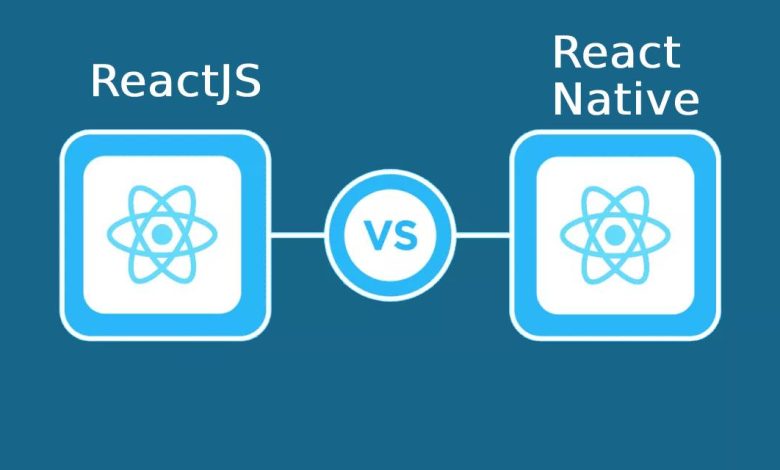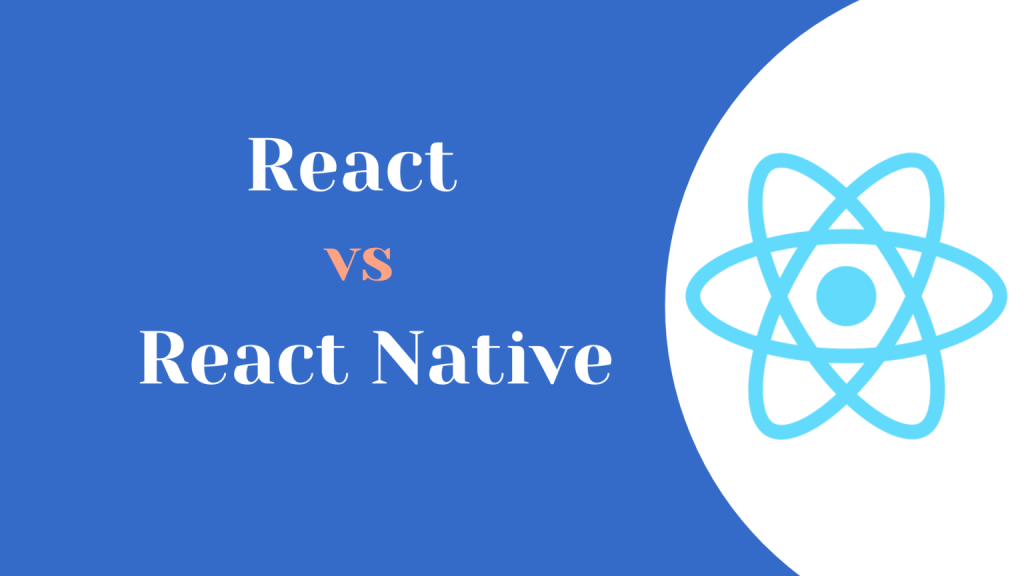ReactJS vs React Native- Understanding Differences from Scratch

ReactJS or React Native? Which one will be suitable for your project? There are a lot more similarities between ReactJS and React Native. But it’s important to know what makes them different, and their unique features. Here’s a detailed comparison of React vs React Native that will help you pick the best framework for your next project.
You might be aware of why their names are similar; it’s because React Native is based on React in many ways. React works well for web app development, while React Native is for mobile app development.
React Native was intended to ease and quicken the development of web and mobile user interfaces using JavaScript, a robust programming language. These systems are not rivals or opponents to one another but rather siblings.
When a corporation is faced with the decision of which technology to choose for a project, ReactJS or React Native, it is essential to understand the distinction. In the React vs React Native debate, we briefly describe a comprehensive analysis of both technologies.
React Native vs ReactJS
Let’s begin with what React Native and ReactJS have in common. They both were created by Facebook as open-source technologies to help them produce superior mobile apps.
They often use JavaScript, one of the world’s most popular and user-friendly programming languages. However, the resemblance between React Native and React JS ends here.
So, what distinguishes React JS from React Native?
React JS is indeed a JavaScript library for making web app development more accessible and producing UIs that are light, speedy, and responsive. It focuses on front-end performance.
Conversely, React Native is a framework for developing mobile applications. It’s intended to assist you in developing cross-platform applications that perform equally well on iOS and Android.
It is also intended to assist your mobile app in efficiently connecting to your backend data systems. Use them independently or together, but they both offer massive potential for your subsequent application development.
Now, let’s see each of these JS frameworks individually.
What Is React?
React has a crucial role in battling with only a few modern techniques in developing interactive user interfaces (UIs) (particularly in web development).
Facebook developed this JavaScript library in 2011. The purpose was to promote the development of advanced single-page apps in terms of updating and graphics. For this purpose, web developers were introduced to a Virtual DOM- a virtual representation of DOM (Document Object Model).
To minimize the number of changes on the actual DOM, the virtual DOM creates a temporary tree. Hence, web app performance improves. React’s the use of self-managed reusable components speeds up product development significantly.
The development cycle for React web developers is described as quick and trouble-free.
After Facebook released the toolkit open-source, React has grown in popularity among the international society of web developers. Amazon, Twitter, Uber, and Netflix are just a few digital juggernauts that employ React for their web apps.
What is React Native?
React Native, unlike React, is a framework. It follows most of React’s design guidelines for creating near-native mobile apps.
React Native combines two techniques for app development: JS-based and Native.
Mostly of the code is written in JavaScript, with some high computational platform-specific aspects handled via native plugins.
It works like this:
- WebKit executes JavaScript code to generate virtual DOM.
- The native view hierarchy is changed.
- On the Javascript end, virtual DOM is resolved.
- JS delivers information about changing the native view hierarchy via the JS-to-native bridge.
The crucial thing is that the view hierarchy is generated with native components.
This is not the situation with hybrid apps in which WebView is drawn natively, and the information within WebView is shown as a regular website. Ionic is an excellent example of a hybrid framework.

Advantages of ReactJS vs React Native
ReactJS Advantages
The underlying React qualities can help you determine whether the technology is suitable for your project from a commercial standpoint:
Reusable components for faster and low-cost development
With more minor components used to make an app, the cost of the app also decreases. React allows you to reuse code across components. Furthermore, when one component is modified, the others are unaffected. Because of React’s component-based structure, debugging and testing are becoming less common.
Unidirectional flow of data makes maintenance easier
React utilizes unidirectional data connection to keep parental code components unchanged while child ones are modified. In other words, any little changes do not affect the entire software. A solid code makes app maintenance considerably easier.
Virtual DOM processing saves energy resources
With its front-end features, React allows you to write HTML with JavaScript. The feature reduces updating DOM items with a virtual tree when producing HTML graphics. As a result, the web app development process is sped up while using limited resources.
Apps with faster loading times are more SEO-friendly
When website content loads faster, people stay on the site longer. As a result, conversion rates improve. Because of the faster loading time it gives, React enhances the SEO ranking of web apps.
React Native Advantages
The underlying React Native qualities can help you determine whether the technology is suitable for your project from a commercial standpoint:
Cross Coding
The days of developing multiple codes for several platforms are over. React Native allows you to create apps that can run on Android, iOS, Linux, Windows, and more systems. It recognizes and loads the code required for a specific platform.
High Mobile Help
Unlike some other Native systems that rely on CPUs (Central Processing Units), React Native makes use of GPUs (Graphics Processing Unit). As a result, the apps it creates are incredibly speedy and very well for smartphones.
JS Language
React Native is built on JavaScript, a commonly used and respected programming language.
Because most web developers are familiar with JavaScript, the platform is simple to use and understand.
Deployment of Node Package Manager (NPM)
For unskilled developers, installing an application might be a time-consuming operation.
NPM is supported by React Native for deployment. This functionality is helpful for startups because NPM instructions are simple to learn and implement.
Disadvantages of ReactJS vs React Native
ReactJS Disadvantages
- Downloading another react-enabled library adds costs and time. If a developer uses Carbon for UI, they must download Carbon components with react.
- Reactjs’s learning curve is steeper than React Native’s. Reactjs has a steeper learning curve, which might be a problem for inexperienced developers.
- ReactJS allows many external libraries, but there are few native libraries. Now, additional libraries can assist developers in using HTML and CSS in JSX, which has a high learning curve.
- Reactjs has a complex data hierarchy and mobility.
React Native Disadvantages
- Absence of native libraries: React Native may slow down production due to reliance on 3rd libraries if the project has substantial functionality.
- React Native is a lightly held framework that lets developers use HTML, CSS, and Javascript. This gives developers more flexibility, but it also raises obstacles.
- Licenses and patents issues. Since Facebook owns React Native, licensing and patenting problems exist. Facebook revised Reactjs, React Native, and other open-source licenses and patents in 2017.
Which is better, React or React Native?
ReactJS and React Native are significant foundations for application and web creation. They gather steam daily due to their flexible functions and an evolving ecosystem of libraries.
Reactjs is a JS library, and React Native is the whole framework; the former serves as the core of React Native and complements it.
If Reactjs is suitable for generating apps with high functionality and complicated computations, then React Native is good for giving your mobile apps a native feel.
Every technology or framework in the developer realm has restrictions, and Reactjs and React Native are no exception.
As a result, it is recommended to map both technologies’ pros and cons before making an informed choice, planning, scheduling, and projected outcomes.
Final Verdict
Summarizing the whole piece, it is clear that if your requirement is a mobile app, go for React Native. Or choose to React for web app development requirements. Moreover, hiring an experienced developer will also help you with your confusion about ReactJS vs React Native developers.
EnProwess Technologies is a global software and app development Company; we are a group of experienced Angular developers. They have demonstrated their intellect by working on numerous massive projects for our illustrious clientele worldwide.





